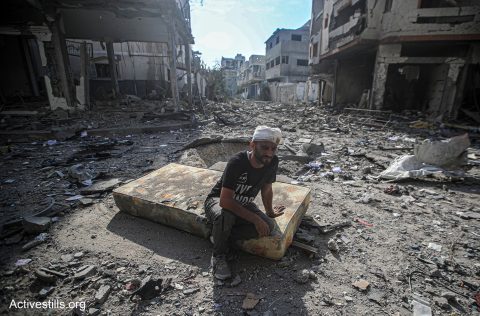
2020 has been a rough year for cancer patients in the Gaza Strip. The usual restrictions and blockade were compounded by additional obstacles, which severely affected patient access to treatment: stricter criteria imposed by Israel, the collapse of the coordination mechanism between the Palestinian Authority and Israel, and other restrictions imposed by Israel and the Gaza authorities due to the coronavirus pandemic. All this has taken a heavy toll, leaving patients in a state of severe anxiety, with many unable to access critical, sometimes life-saving, treatments.
Click here to read the full position paper
Many types of oncological treatment, including chemotherapy, radiation therapy, and PET/CT scans—significant components of diagnosis, treatment, evaluation and monitoring of the disease—are not available in the Gaza Strip. This is why, despite the fear of possible infection during the journey to the hospital or in the quarantine facilities in Gaza upon returning, many patients have had no choice but to file applications for travel permits and face the labyrinthine permit regime.
If this wasn’t enough, a void was created when the Palestinian Authority announced it was stopping coordination with Israel after the latter announced plans for annexation in the West Bank. Israeli authorities meanwhile persisted in their bureaucratic demands, refusing to provide safe and unimpeded passage to patients in desperate need of treatment. In the face of this reality, human rights and civil society organizations picked up the mantle and worked to help patients, most of whom need life-saving care, apply for permits so they could access treatment in time.
From June to August 2020, PHRI processed 105 requests from cancer patients who needed travel permits, including applications for parental accompaniment in the cases of 32 minors. According to COGAT figures, only 60% left with a parent, while 40% either traveled alone or with another adult, who in some cases had no relation to the minors.
The position paper also uncovers a shift towards stricter requirements under the permit regime, with cancer patients seeking exit being asked to provide biopsy results in addition to medical reports already supplied. PHRI also observed inadequate solutions for urgent ambulance evacuation. Without the status quo coordination mechanism, human rights organizations, including PHRI, were forced to try to make these arrangements.
The permit regime, which would perhaps be more aptly called the control and obstacle system, has taken a heavy toll again in 2020. Two children passed away while waiting for a permit that would allow their parents to take them to open-heart surgery. An 18-month-old diagnosed with advanced, acute leukemia needed our help, including legal action, so his mother could finally travel with him to receive the treatment, though not before she went through a security interrogation. A cancer patient was required to supply a biopsy report on top of her medical report and referral, and undergo an intrusive, humiliating interrogation before her application was processed, losing precious months before gaining access to treatment.
The restrictions, new and old, send patients into a Kafkaesque maze of scheduling treatments and applying for permits over and over again, all while bearing the immense burden of anxiety facing anyone battling cancer.
When we say this is a matter of human life, it is not hyperbole. The security agencies and the military hold the keys to Erez Crossing. They choose whether to let patients through or block their path. The patients we assisted in 2020 are the very tip of the iceberg. This issue runs as deep as the occupation and oppression. We can only continue to demand that patient access to treatment is no longer subjected to the permit regime, which must become a thing of the past.











